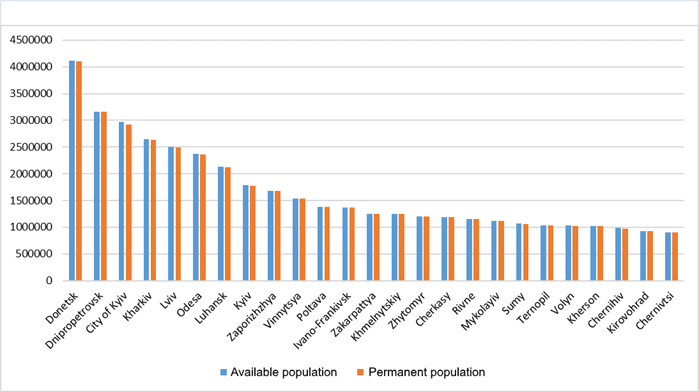UKRAINIAN POPULATION BY REGIONS AS OF dEC 30, 2020 (graphically)


The Pivnichny (Northern) Economic Court of Appeal upheld an appeal of CJSC Philip Morris Ukraine and Philip Morris Sales and Distribution LLC in case No. 910/17723/19, canceled the decision of the Kyiv Economic Court dated August 5, 2020, and canceled the fines for a total amount of UAH 1.18 billion imposed on them in 2019 by the Antimonopoly Committee of Ukraine (AMCU). According to the court’s decision, promulgated in the unified public register of court rulings, the Pivnichny Economic Court of Appeal ruled to invalidate paragraphs 1 and 11 of AMCU decision No. 697-r dated October 10, 2019 that concern the PMI group of companies, as well as invalidate paragraphs 3 and 4 of this solution.
In addition, the court ruled to collect UAH 14,400 of court fee from the AMCU in favor of OJSC Philip Morris Ukraine (the settlement of Dokuchayevske, Kharkiv region) and Philip Morris Sales and Distribution LLC (Kyiv).
The Pivnichny Economic Court of Appeal also ruled to return the materials of case No. 910/17723/19 to the Economic Court of the city of Kyiv.
The decision of the appellate instance entered into force from the date of its awarding.
As reported, the AMCU in October 2019 imposed a fine of UAH 6.5 billion on four tobacco producers and distributor Tedis Ukraine for anticompetitive concerted actions. Later, Philip Morris Ukraine paid a fine to the AMCU in the total amount of more than UAH 1.18 billion in order to avoid the accrual of penalties, but in February 2020, PMI submitted a notification to the Ministry of Justice of Ukraine that Ukraine had violated a number of obligations under investment protection agreements.
The companies of the Philip Morris International group on December 21, 2020 also filed a claim about bilateral investment arbitration against the government of Ukraine with the International Centre for Settlement of Investment Disputes (Washington, DC, the United States) in connection with the unfair, in their opinion, decision of the Antimonopoly Committee of Ukraine (AMCU) to fine them UAH 1.2 billion in the case of the wholesale distributor Tedis Ukraine.

Ukraine, as a European country, has the right to become a member of the EU, but must first fulfill the Association Agreement and the reform program, a high-ranking European official has said.
“We are linked with Ukraine by the Association Agreement signed in 2014, including the Deep and Comprehensive Free Trade Area (DCFTA) Agreement, and now we must do everything possible to make it a success story,” he said, announcing the participation of Ukrainian Foreign Minister Dmytro Kuleba in a videoconference of EU foreign ministers.
He noted that this agreement has a huge potential in terms of the economy and social development of Ukraine, while Brussels and Kyiv should focus their efforts on its implementation.
“Ukraine is a European country and in this capacity it can become a member of the EU,” he told journalists.
“But this is not what is on the agenda right now. Today we are talking about the implementation of the Association Agreement, about holding reforms, about things that usually precede the process of joining the union,” the official said.
He said that on Monday Kuleba will join the video meeting of the foreign ministers of the EU countries and will talk with them for about an hour.
“The Ukrainian army has been constantly on alert for seven years, Ukraine spends 6% of its GDP on defense, which it more needs on other budget items,” the official stressed.
In his opinion, Ukraine will be able to move forward, overcoming the conflict in the east of the country and actively pursuing reforms. At the same time, the EU is ready to provide financial and economic support to Kyiv.
“We will continue to do this, because we see this as the only possible way to ensure that Ukraine is a truly independent, sovereign country,” the EU official said.

President of Ukraine Volodymyr Zelensky offered French President Emmanuel Macron to sign a declaration of support for Ukraine’s accession to the European Union.
“We have made a declaration that we conclude with partner countries, member states of the European Union, in which this or that country signs a declaration with us, indicating its support of Ukraine in striving to be a member of the European Union. Frankly speaking, several countries have already signed this declaration. There are countries that are now reviewing this declaration. I told the details of this declaration. I suggested that France also support Ukraine. I believe that President Macron will get acquainted with this declaration and give his answer,” Zelensky said at a briefing on the results talks with French President Macron in Paris on Friday.
Zelensky also said the Declaration on the European Perspective of Ukraine is an initiative of our state, which “does not want to wait until everything is done for us.”
“We are very proactive in Ukraine. We do not wait for everything to be done for us. We ourselves are taking concrete steps,” Zelensky said.
As reported, on March 18, a meeting of the presidents of Ukraine and Lithuania took place, during which they signed a Declaration on the European perspective of Ukraine.
EMMANUEL MACRON, EUROPEAN UNION, FRANCE, PRESIDENT, PRESIDENT ZELENSKY

Vaccination against COVID-19 with the vaccine produced by Pfizer/BioNTech (trade name Comirnaty) will begin from Kyiv region on April 18, its starts throughout Ukraine on April 19, said chief sanitary doctor, Deputy Minister of Health Viktor Liashko.
“This vaccine will first of all be used to vaccinate personnel and residents of nursing homes, then employees of the State Emergency Service and border guards,” he told Interfax-Ukraine on Friday.
Liashko explained that the vaccines will be distributed in 1,170 doses in each of the regions and the city of Kyiv. Together with them, dilution bank, syringes and boxes for the safe disposal of medical waste will be delivered.